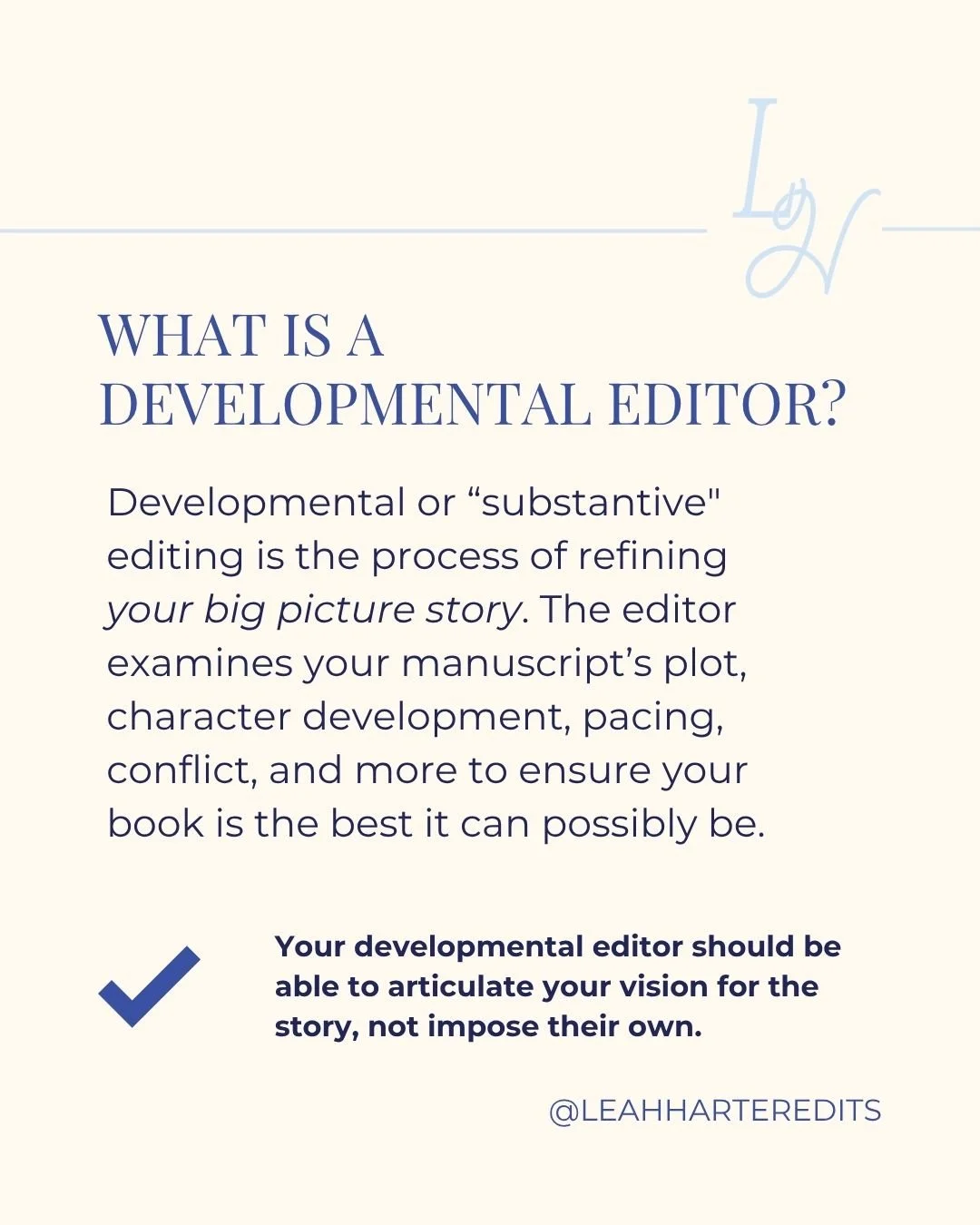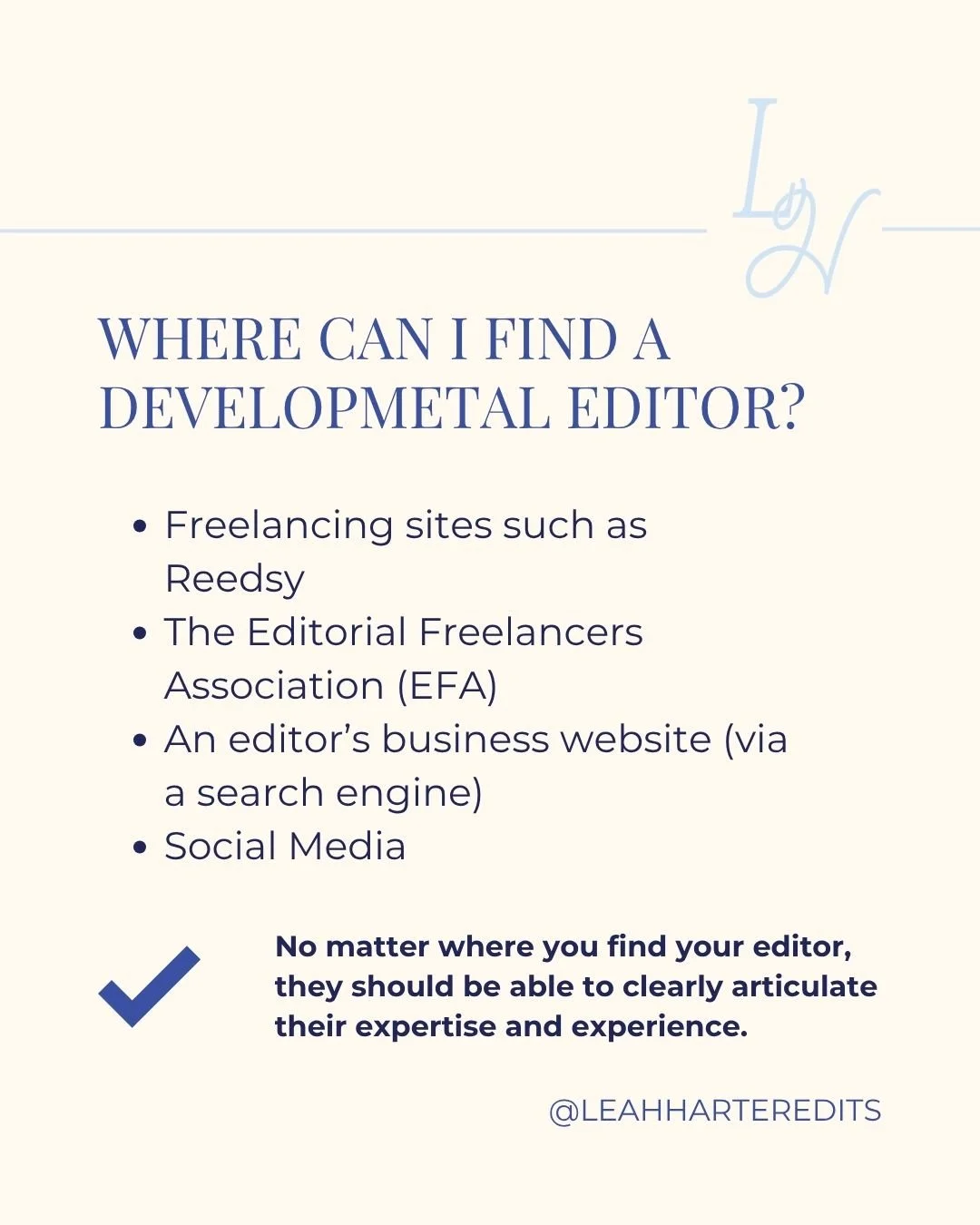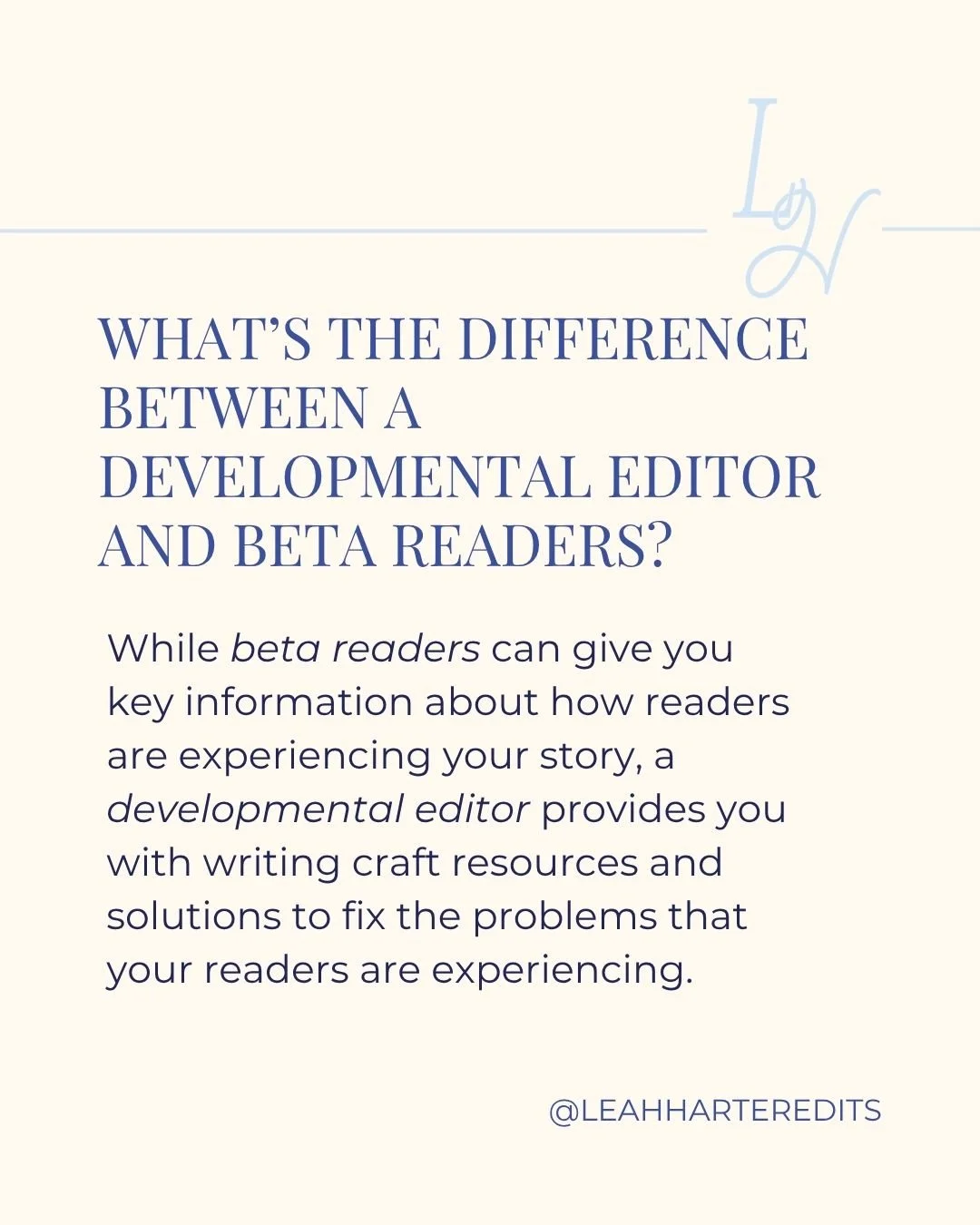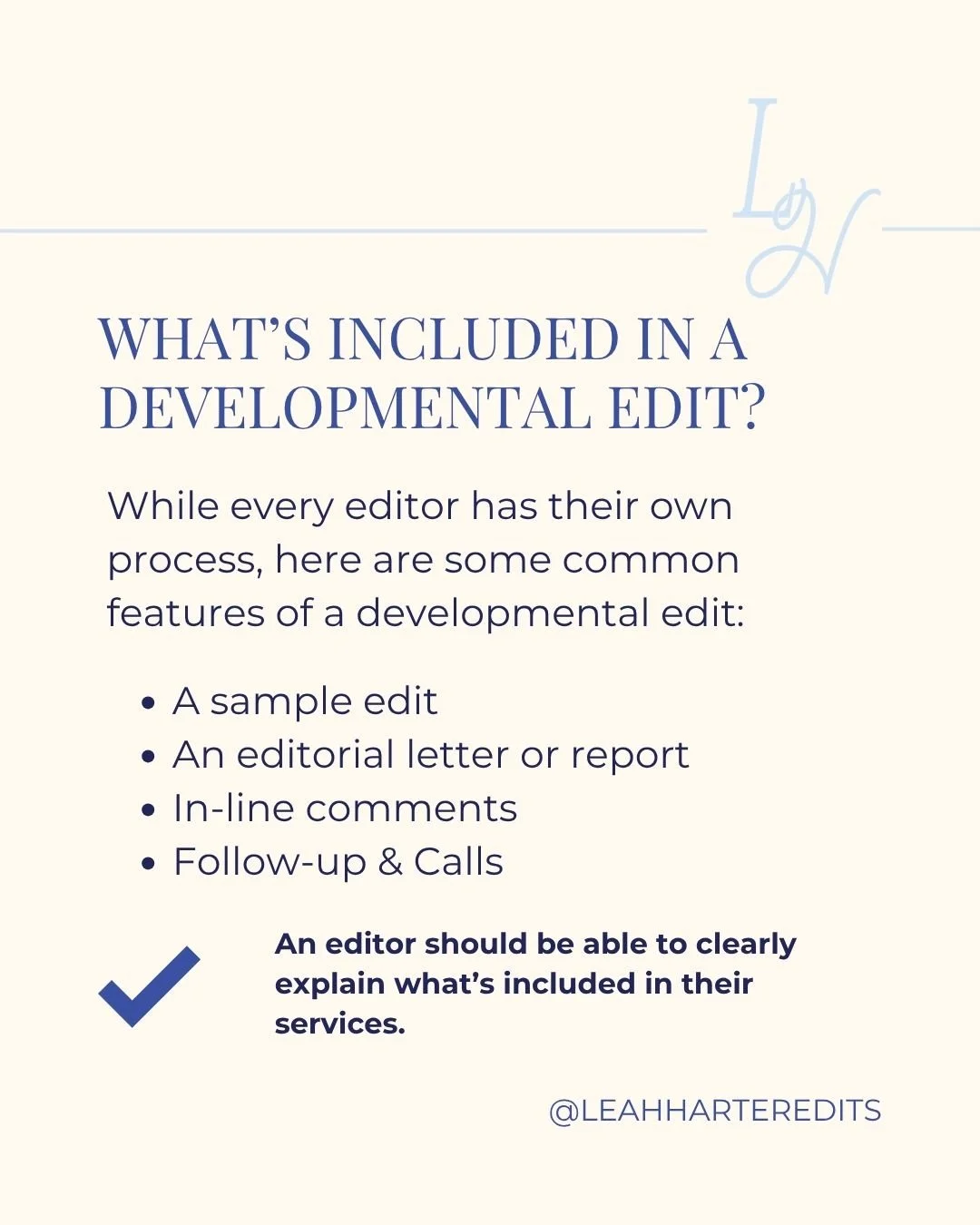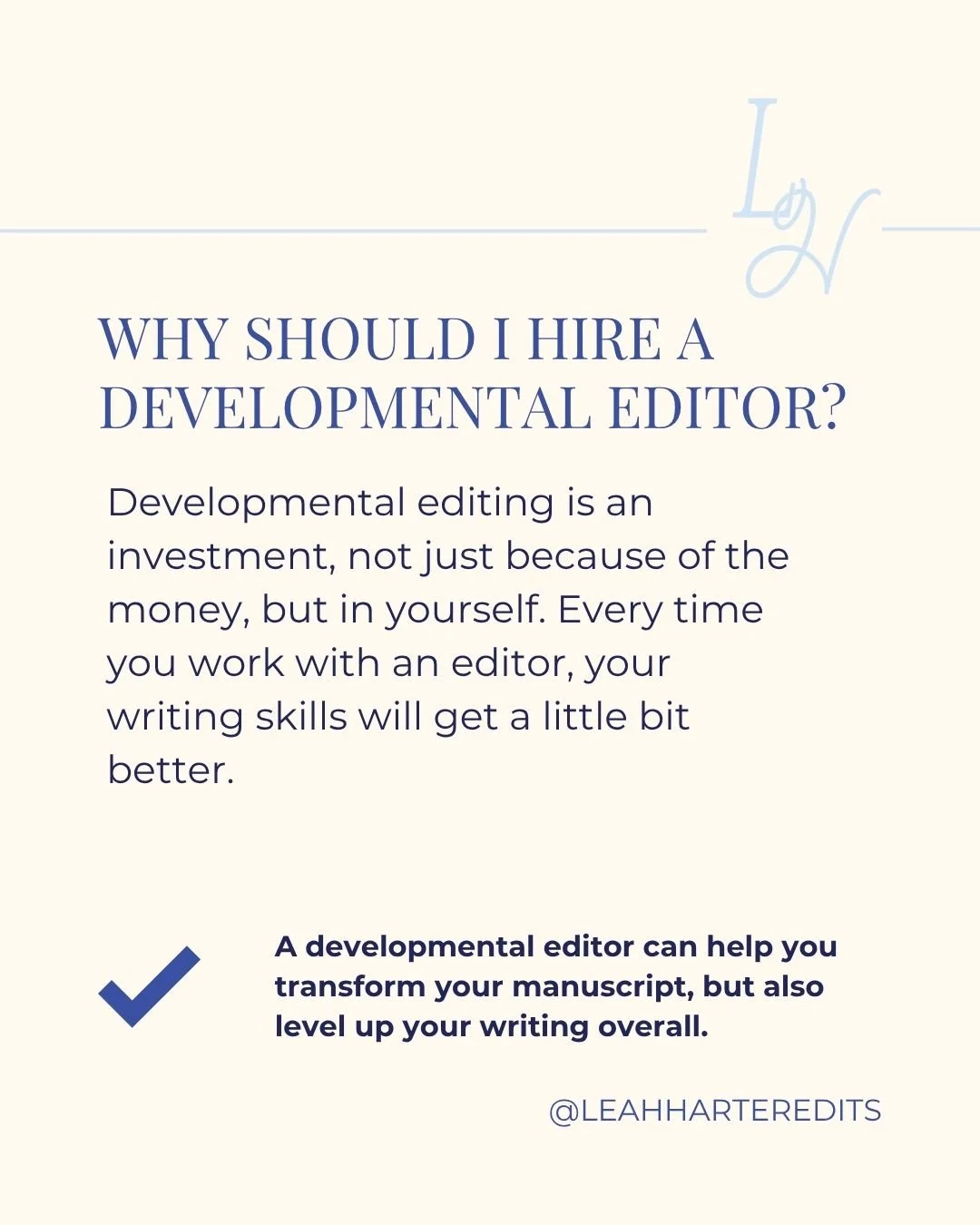How to Hire a Developmental Editor
If it's your first time looking for a developmental editor, you're in the right place. This is my comprehensive guide about how to hire a freelance developmental editor to review your manuscript.
Developmental or “substantive" editing is the process of refining your story for consumption by readers. The editor examines your manuscript’s plot, character development, pacing, conflict, and more to ensure your book is the best it can possibly be.
Writers seek out a developmental editor for many reasons. In my experience, the most tangible benefit from seeking a book editor is receiving professional advice based in writing craft. Oftentimes, writers are too close to their stories to see its flaws and areas from improvement. A professional editor can help you identify these opportunities within your work and guide you through the process of revision.
Everyone’s path to publishing is personal and unique, which is why it’s important to find the right book editor for you—not just the one everyone is raving about online. This guide is designed to be a tool to help you make this choice with confidence.
Let's talk about what it's like to work with a developmental editor.
What is included in a developmental edit?
What to expect:
Every editor has their own process for revising a novel. It's important that you select an editor whose process aligns with your learning and writing style. Have up front conversations with everyone you hire during your publishing journey about your strengths and weaknesses. This will help the professionals you are looking to hire best support you in your writing and editing journey.
You will find that freelance editors all have their own packages, rates, and styles for providing feedback. However, there are some standards across the industry. Here are some important terms to know:
Sample Edits
A sample edit is like your opportunity to test out different editors to see which ones is the best fit for you. Most editors offer some type of free or low-cost sample edit in order to experience their services.
For example, I provide free 2000-word sample edits with inline comments, which I review with potential clients during a discovery call. This gives writers the experience of reviewing written feedback from me and receiving verbal analysis of their story. Writers experience both when working with me, so I give them a taste of each to help them in their decision-making process.
Editorial Letter or Report
An editorial letter or editorial report is a comprehensive document with written feedback on your manuscript. Think of this like a book report on your novel. The structure of this varies widely from editor to editor.
For example, my editorial report typically comes out to about 30-pages depending on the length of the manuscript. I address things like genre conventions, act-level and story-level structure, character development, and more. I prioritize addressing aspects that will have the biggest impact on both the current project and the author's development as a writer.
In-line Comments
These are exactly what they sound like—comments in either the text of your manuscript or using Microsoft Word's comment feature. Editors commonly use these to highlight manuscript sections needing attention. Comments are a great tool to show the specific places in your manuscript where a writer is successfully executing writing craft in addition to highlighting areas for improvement.
For me, in-line comments are the most time-consuming part of my editing process. This is why I offer one package that does not include them, so I can offer writers a developmental edit at a discounted price. I love writing comments because I know that most writers find them insightful when reviewing their edits. However, they aren't for everybody and some writers need a more hands-off approach.
Follow-up & Calls
Most editing packages come with a follow-up call with your editor to discuss your manuscript. The way to make the most of these calls is to review all of your edits and bring questions for your editor to answer. Your contract with your editor should specific preferred communication, including method and frequency, should you have any questions about your edit.
As a data point, my packages come with either one or two follow-up calls. Writers can request more for a fee. In addition, writers are able to ask my unlimited questions via email for 30 days following the receipt of their editing package.
Passes/Reads vs. Rounds
These are some terms that might be confusing to new writers. A pass or read is how many times an editor goes through your manuscript before returning it to you. This is how many times an editor reviews your manuscript within their own process. A round of developmental editing consists of editor feedback, an opportunity for you to complete revisions followed by another editor review to verify correct implementation of the recommendations.
I complete my work in passes or reads. If writers would like to verify that their edits were successful in achieving their desired reader experience, I recommend doing a manuscript evaluation (which is lighter than a full developmental edit).
Where can I find a developmental editor?
There are many places to find a developmental editor. One place to look is freelancing sites such as Reedsy. However, these come with their own downsides. Reedsy is known for gatekeeping many qualified editors simply because the books they've worked on have not been published by a traditional publishing house. While some may have found luck there, I generally don't recommend Fiverr when looking for an editor.
Another place to check is the Editorial Freelancers Association (EFA), which will post your job for you for editors to compete for. The EFA offers classes in developmental editing and many of their members gain experience in this way.
Lastly, you can find a freelance editor through their website by using google. I recommend searching for editors within your genre. For example, if you're writing contemporary romance, you might search "Freelance Developmental Editor Contemporary Romance" and contact the top results. Reputable developmental editors for hire are going to have a website or at least a landing page in order to market their services.
It's becoming more common for my clients to find me via social media. While this can be a tricky place to find a qualified and experienced editor, many freelance developmental editors have a strong online presence. Visiting their pages can be another way to verify their expertise.
What is the difference between a developmental edit and beta readers?
Many writers swear by beta reader feedback in order to help them revise their drafts. While early readers can give you key information about how readers are experiencing your story, a developmental editor provides you with writing craft resources and solutions to fix the problems that your readers are experiencing.
A beta reader will tell you that your book is too slow at points. A developmental editor will tell you that the external conflict isn't present for several chapters making it feel like the plot isn't moving forward.
Ultimately, a developmental editor will make suggestions and recommendations based on writing craft and experience. They are more than just a member of your audience, but a trusted advisor and collaborator in your process.
Here are some qualities I recommend you look for when hiring a freelance editor:
Communication
When looking for a fiction editor, their ability to correspond with you in a timely and professional manner is a huge indicator of their ability to help you edit your manuscript. An editor who doesn't communicate well with you during the discovery phase is unlikely to provide you with clear feedback in the long run. While you are considering hiring someone, take note if they are unresponsive, noncommittal, or don't have a clear plan for how to work on your manuscript.
You'll save yourself a huge headache in the long run.
Expertise
A book editor may be one of the most important choices you make in your publishing journey. They should be able to provide testimonial from happy clients and proof of their ability to conduct an edit, whether that be courses or a degree in an editing adjacent field. Some editors are self-taught or get experience in a publishing house. Prior to the rise of freelance editing, editing was an apprentice skill meaning that you learned from a senior editor who taught you the trade.
Not only do you want to find a professional who is trustworthy, but someone who is experienced within your genre. If you're writing commercial fiction, make sure your editor who has worked in your subgenre like paranormal romance or historical fiction.
I primarily edit speculative fiction including fantasy, science fiction and their subgenres, but I also have experience editing contemporary romance and literary fiction. I only accept projects I'm sure I can edit successfully.
Able to Articulate your Vision
Ultimately, hiring an editor is a business decision. Your ability to choose a service provider, who not only has expertise within the industry, but can also repeat back to you what you are looking for is crucial for your long term success. fit for your book.
When you talk to editors, make sure that they are able to articulate your vision for your manuscript. You’re going to want someone who can make your story come to life, not someone who inserts themselves into the editing process. A good editor will help you achieve your desired outcome. They will not force you to adopt their recommendations. You’re looking for someone who is collaborative in nature and makes you feel like you are in the driver’s seat of the editing process.
Why should I should I hire a developmental editor?
Outside of their ability to provide quality feedback on your writing, you're going to want an editor who fits with your personality. Writing is a business. As the author, you are the leader of your publishing journey. You will come into contact with editors, cover designers, agents, assistants, publishing houses and more. When building your team, prioritize selecting people you enjoy collaborating with and who excel at their roles. A team member who you don't get along with or who doesn't do a good job will stress you out and influence the success of your book.
Choose wisely.
If you're looking to get published at a traditional publishing house, a professional editor is a great way to ensure your manuscript is ready for querying agents. Editors are familiar with industry standards and can help your book stand out in the market with their editorial services. This doesn't mean that your manuscript will not receive more feedback from your agent, in order to catch the eye of an acquisitions editor.
If you're self-publishing, it's your responsibility to make sure that your book is the best quality story that it can be. Developmental editing is an investment, not just because of the money, but in yourself. Every time you work with an editor, your writing skills will get a little bit better. An experienced developmental editor is one part coach, one part writing expert and one part business professional. They can help you transform your manuscript, but also level up your writing overall.
What if I cannot afford an editor?
Sometimes writers ask me: if I can only afford one type of editing service, which one should I pick? It’s a tricky question to answer. Whether you need a developmental editor, a line editor, or copy editor depends on your strengths as a writer. Meaning that if you can only afford some editing services, pick the ones that you feel the least confident in your abilities.
Ultimately, investing in an editor is the most efficient and practical way to get professional feedback on your story. A developmental editor is a key step in getting your manuscript ready to be in the hands of readers.
That’s all for now! For more writing tips and tricks, feel free to reach out to me or learn more on my Instagram below:

